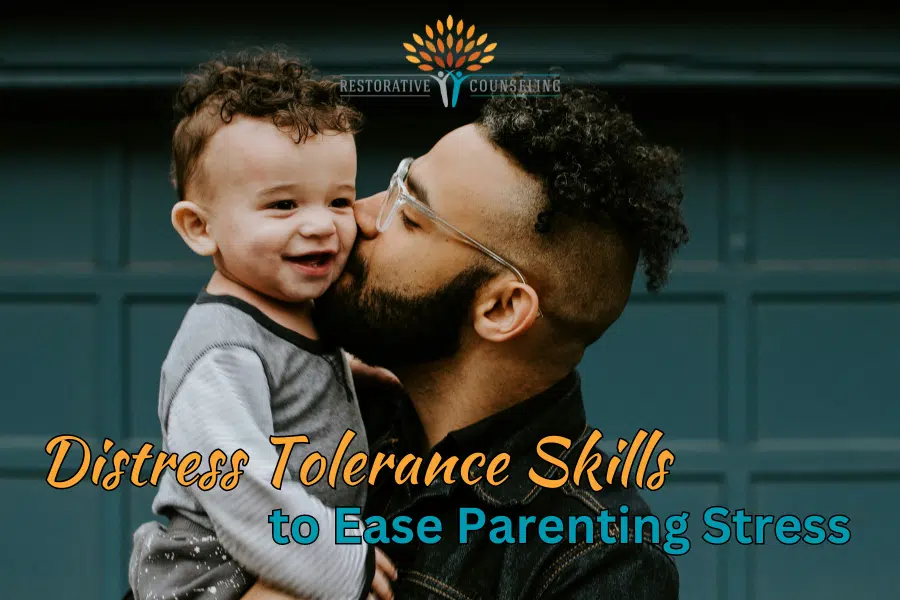Written by Katie Jackson-Griffin, LCPC
Dialectical Behavior Therapy (DBT) skills are useful in many areas in life. They can be applied in your personal internal life, at work, and even for parenting. Parenting can definitely test you emotionally. It’s a huge responsibility to care for another human being. Often, these responsibilities fall on top of what you already have going on with work, relationships, taking care of yourself, and striving toward future goals. Focusing on your own emotional regulation can be essential to help you get through the day and help raise children with your values.
As an example, consider Javier and his 3-year-old son, Joseph. Javier has been finding himself feeling increasingly agitated and frustrated with Joseph. Joseph has been struggling with getting out of the house on time for school. This has caused Javier a lot of anxiety. Javier strives to be an empathetic parent, but he struggles with yelling and sometimes making unkind comments. While he knows that he can’t be perfect, he has found himself losing control more often and not being able to be the type of parent he wants to be.
Javier decides to seek out the help of a therapist. As a result, he is able to learn concrete distress tolerance tools that allow him to feel more confident in his parenting.
What is Distress Tolerance and how can it help?
Essentially, distress tolerance skills help you cope with your emotions. These skills allow you to acknowledge, validate, and manage your uncomfortable emotions so that you can deal with difficult situations. Naturally with parenting, you will find yourself in challenging scenarios. When your emotions are heightened, it is much more difficult to react in ways that diffuse the situation instead of escalating it. Distress tolerance skills can help you regulate your emotions to make an intentional choice on how you’d like to respond in a more effective way. Your use of DBT strategies will also model and teach these skills to your child!
With Javier, a big source of stress was getting out of the house on time with Joseph for school. He would notice that they were running behind and then start to get anxious. Javier would experience racing thoughts such as, “What if we are late?”, “Will my son get in trouble?”, “Will the other parents and teachers think I’m a bad parent?”, and “Why doesn’t my son listen to me?” This self-doubt only intensified his anxiety and then turned it into frustration and anger toward his son. As a result, Javier would yell and sometimes use unkind words such as “Why are you being so slow?”, “Why don’t you ever listen to me?”, “Can you not do it?”, and “Why are you being like this?” Naturally, this would only lead to an escalation of the situation, in which Joseph would start to cry and further struggle to follow directions to get out of the house. Afterward, Javier would feel ashamed about how he treated Joseph.
Distress tolerance skills offer some concrete steps to help change this pattern.
Learn how to overcome your parenting struggles.
Here are 4 Distress Tolerance Skills to help Regulate instead of Escalate
1. Recognize an Emotional Crisis is Coming
Noticing and being in-tune with your emotions can help you be prepared for how they might escalate. Being prepared in this way can sometimes help you stop the crisis from forming. One way to practice includes doing check-ins with yourself throughout the day. You can find a few quiet moments to consider how different parts of your body are feeling and then identify the emotion. This exercise can help you learn your own signs of different emotions, such as recognizing how your heart starts to beat faster when you feel anxious. Additionally, preparation can look like identifying how certain situations tend to result in an emotional response within you. Try listing out what situations tend to make you most anxious. Thus, this empowers you to be proactive about your coping. For example, if you already know that meeting new people is difficult for you, you can start using your coping skills early when you know that this situation is about to occur.
For Javier, he was able to start noticing that he tends to feel tension in his shoulders, discomfort and nausea in his stomach, and a racing heart when his anxiety increases. Since he is more in-tune now with his feelings, he can notice his anxiety sooner and take action. He can calm his anxiety by deep breathing, counting, or closing his eyes briefly. Additionally, Javier knows that leaving for Joseph’s school can be hard for him. So, first thing in the morning, he starts his preparation with mantras such as, “I can cope with leaving for school,” “It makes me anxious to get ready,” and “I am going to get ready 15 minutes earlier than usual to try and reduce my anxiety.” This preparation makes a big shift in how Javier is able to contain his anxiety.
2. Practice Emotional Grounding
Grounding is when you plant yourself in the present moment and work to identify the facts instead of only focusing on how you are feeling. You want to shift your focus to observing what is happening to contain the emotion. A clue that you’re struggling with being grounded is having thoughts that start with “what if.” These thoughts are often in response to anxiety and really amplify your fear.
The “what if” thoughts Javier had only made his anxiety worse. He feared that there would be big consequences for running late. These fears would then make his anxiety and frustration feel out of control. Combating the fear with grounding can help him regulate his emotions.
Javier was able to shift his thinking to thoughts about the facts:
“If we are late, I will sign him in up front.”
“If the teachers talk to me about this being an issue, I will be share about how we are struggling since everyone struggles.”
“Most people are not present to judge others. Most people are compassionate.”
“If I am judged by others, I will deal with that. I don’t have any evidence to support that it is happening right now.”
By recognizing that the consequences of them being late weren’t so terrible, Javier was able to remain much calmer. This helped Joseph, as well.
3. Use Radical Acceptance
Radical acceptance helps to highlight what you have control over while also encouraging you to stop resisting what you don’t have control over. It’s okay to not like aspects of a situation. Resisting only serves to escalate the intensity of the emotional experience. Instead, try to separate what you have control over and what you don’t. Then, you can put your energy toward what you can control.
With Javier’s use of radical acceptance, he can recognize that he can’t physically force his son to move any faster each morning. Joseph is getting increasingly difficult to pick up and carry. Also, Javier doesn’t want to escalate the situation with Joseph further. Javier recognizes that he can control his own attitude when interacting with his son. If Javier acts light and silly, Joseph often will respond in turn and follow along with his father. Javier also recognizes that he is in control of when they start to get ready. Even though Javier doesn’t want to spend more time getting ready, he chooses to radically accept that Joseph does not do well under pressure. Thus, Javier accepts that they need more time to get ready. This perspective shift makes a huge difference in both of their moods so they can get out the door on time.
4. Engage in Sensory Self-Soothing
Sensory self-soothing uses the five senses to calm down. By targeting even one of the senses, it can create some much-needed relaxation. Some examples of self-soothing include starting a collection of pictures that you find pleasurable and soothing to look at, listening to music you find soothing, wearing lotion with your favorite scent, wearing your comfiest clothing, or eating your favorite hard candy. These activities can be used in a tense moment and in a preventative way to keep your stress as low as possible.
For Javier, he makes a preventative plan to incorporate more self-soothing into his daily life. He fills his home with visually appealing décor and takes time to appreciate it during the day. He starts a practice of putting lotion on that he really enjoys and listening to pleasant music while doing chores. When he feels anxious about getting out of the door for school with Joseph, he makes a plan to ask Joseph for more hugs. Often, this soothes both of them. Javier also has a bracelet he uses essential oils on so he can smell them when he feels escalated in the moment. He notices that over time, he is more able to prevent feeling out of control and can regulate in the moment as well.
Javier was able to find success in easing his parenting stress and so can you!
Distress tolerance skills are just one way to ease parenting stress. Restorative Counseling can help you learn how to incorporate these tools in your life!
Using these DBT tools helped Javier be the type of parent he wanted to be — much more fun and relaxed, while still structured. If you need support with parenting, Restorative Counseling can help! The entire team at Restorative Counseling believes in your ability to tackle hard situations in parenting and beyond. Our clinicians can support you in learning how to regulate your emotions more effectively. To get started, schedule an appointment with one of our clinicians today.

Hi, I’m Katie!
I use HAES and DBT approaches to help people overcome their challenges with low self-esteem, anxiety, and depression. Read more about me.
Follow Restorative Counseling
Sign up for our newsletter

